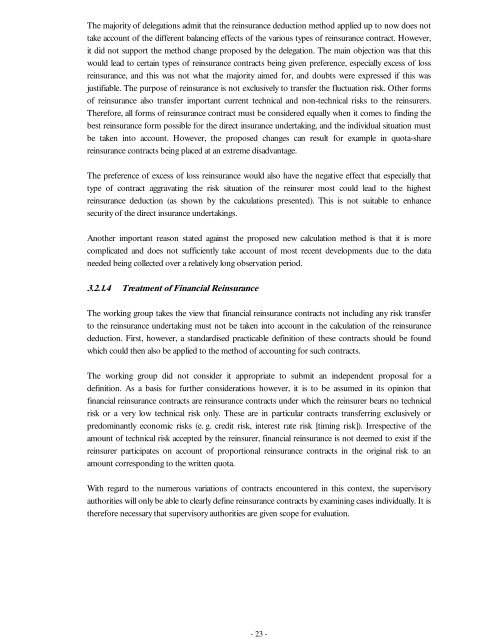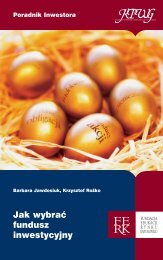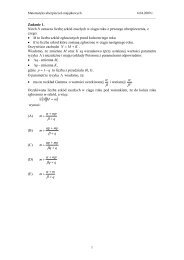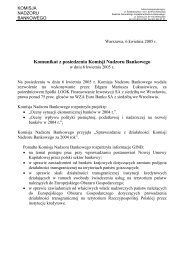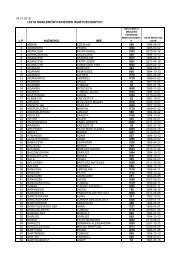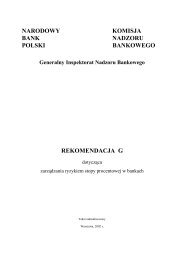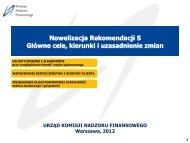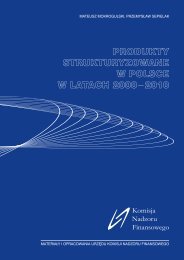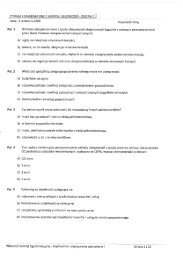Solvency of Insurance Undertakings (Mueller-Report) - Eiopa
Solvency of Insurance Undertakings (Mueller-Report) - Eiopa
Solvency of Insurance Undertakings (Mueller-Report) - Eiopa
You also want an ePaper? Increase the reach of your titles
YUMPU automatically turns print PDFs into web optimized ePapers that Google loves.
The majority <strong>of</strong> delegations admit that the reinsurance deduction method applied up to now does nottake account <strong>of</strong> the different balancing effects <strong>of</strong> the various types <strong>of</strong> reinsurance contract. However,it did not support the method change proposed by the delegation. The main objection was that thiswould lead to certain types <strong>of</strong> reinsurance contracts being given preference, especially excess <strong>of</strong> lossreinsurance, and this was not what the majority aimed for, and doubts were expressed if this wasjustifiable. The purpose <strong>of</strong> reinsurance is not exclusively to transfer the fluctuation risk. Other forms<strong>of</strong> reinsurance also transfer important current technical and non-technical risks to the reinsurers.Therefore, all forms <strong>of</strong> reinsurance contract must be considered equally when it comes to finding thebest reinsurance form possible for the direct insurance undertaking, and the individual situation mustbe taken into account. However, the proposed changes can result for example in quota-sharereinsurance contracts being placed at an extreme disadvantage.The preference <strong>of</strong> excess <strong>of</strong> loss reinsurance would also have the negative effect that especially thattype <strong>of</strong> contract aggravating the risk situation <strong>of</strong> the reinsurer most could lead to the highestreinsurance deduction (as shown by the calculations presented). This is not suitable to enhancesecurity <strong>of</strong> the direct insurance undertakings.Another important reason stated against the proposed new calculation method is that it is morecomplicated and does not sufficiently take account <strong>of</strong> most recent developments due to the dataneeded being collected over a relatively long observation period.3.2.1.4 Treatment <strong>of</strong> Financial ReinsuranceThe working group takes the view that financial reinsurance contracts not including any risk transferto the reinsurance undertaking must not be taken into account in the calculation <strong>of</strong> the reinsurancededuction. First, however, a standardised practicable definition <strong>of</strong> these contracts should be foundwhich could then also be applied to the method <strong>of</strong> accounting for such contracts.The working group did not consider it appropriate to submit an independent proposal for adefinition. As a basis for further considerations however, it is to be assumed in its opinion thatfinancial reinsurance contracts are reinsurance contracts under which the reinsurer bears no technicalrisk or a very low technical risk only. These are in particular contracts transferring exclusively orpredominantly economic risks (e. g. credit risk, interest rate risk [timing risk]). Irrespective <strong>of</strong> theamount <strong>of</strong> technical risk accepted by the reinsurer, financial reinsurance is not deemed to exist if thereinsurer participates on account <strong>of</strong> proportional reinsurance contracts in the original risk to anamount corresponding to the written quota.With regard to the numerous variations <strong>of</strong> contracts encountered in this context, the supervisoryauthorities will only be able to clearly define reinsurance contracts by examining cases individually. It istherefore necessary that supervisory authorities are given scope for evaluation.- 23 -


